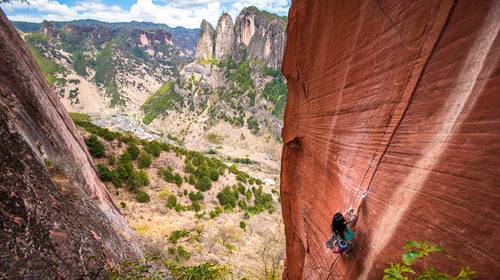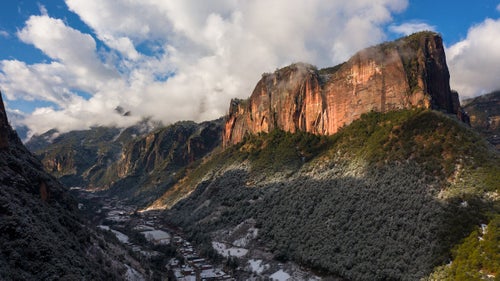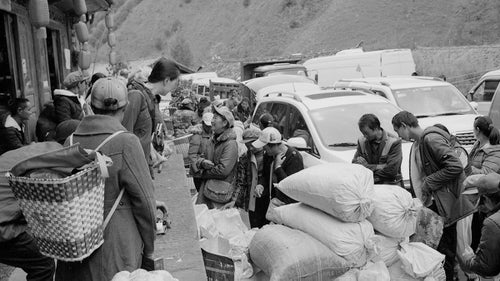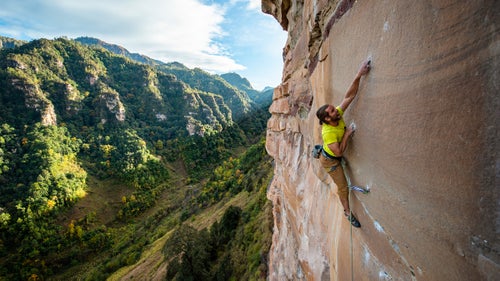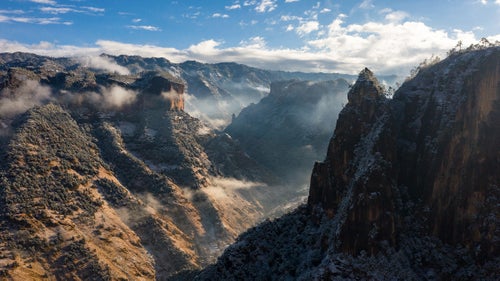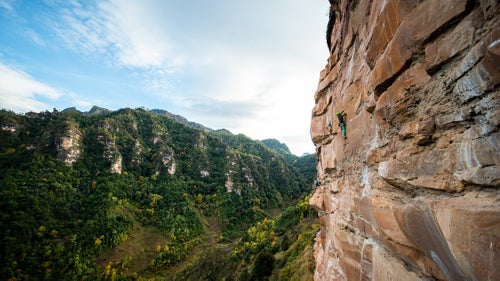China Is an Underrated Rock Climbing Paradise
For the past decade, American climber Mike Dobie has been developing world-class routes outside the remote village of Liming. As the coronavirus triggers anti-Chinese sentiment worldwide, his mission is more important than ever.
New perk: Easily find new routes and hidden gems, upcoming running events, and more near you. Your weekly Local Running Newsletter has everything you need to lace up! .
Sandstone bluffs riddled with crevices. Maroon precipices wrinkled with scaly turtleback rocks. A never-ending wall called El Dorado (named after the Lost City of Gold) rising abruptly at a slight turn in the valley.
During a call with me on January 10, Mike Dobie and Ana Pautler, his fiancee, described the scenery surrounding their home in Liming, a bucolic town high in the mountains of southwest ChinaÔÇÖs Yunnan province. They were calling from the car┬áas they made their way from spending Christmas and New YearÔÇÖs in Seattle┬áto PautlerÔÇÖs hometown of San Francisco. Dobie, a typically reserved rock climber, bubbled with enthusiasm and giddiness as he described the daily offerings in Liming: a local flea market that pops up every ten days where he gets fresh meat,┬áfriendly greetings every morning from a vegetable lady who grows organic potatoes and peanuts,┬áand $2 jumbo stir-fries from his favorite restaurant.┬á
ÔÇťLife there is paradise. ItÔÇÖs quiet, with lots of rock opportunities around,ÔÇŁ said Dobie, 37, who has spent most of the past decade developing trad and sport routes in Liming.
The couple would be flying back to Liming in two days. To prepare for the trip, they had stuffed two giant duffels and a roller bag with 80-meter ropes, resoled climbing shoes, maple syrup, Mexican seasonings, Doritos, and a bag of Tootsie Pops, whose chewy chocolate center and cherry-flavored coating Dobie relishes way too much. He rambled on about their ambitious plan to turn El Dorado, a wall of compacted sandstone and limestone, into a sport-climbing hub. He also hoped to open an Airbnb-style complex of guesthouses in Liming later this year, which would serve as a┬ábase camp for climbers. Five or six local householdsÔÇöa number that would grow if the experiment were┬ásuccessfulÔÇöwould host visiting climbers, make them meals, and offer gear rentals, first aid, and rescue services.
At the end of the 90-minute conversation, I wished them luck with their mission and impending┬áarduous trip: a 30-hour flight from San Francisco, including a two-hour layover in Hong Kong, to Kunming, YunnanÔÇÖs capital. This to be followed by a three-hour bullet train ride to Lijiang, a prefecture-level city in the northwest of the province; and another three hours by car on the bumpy, meandering mountain road to Liming.
I should have told them to wear masks and hoard hand sanitizer, or cancel the trip altogether.

